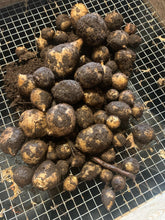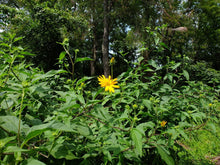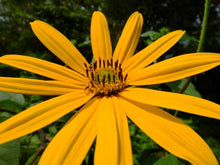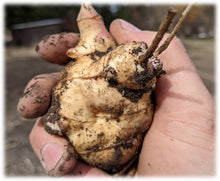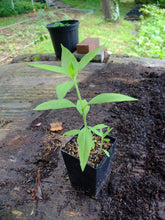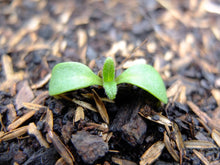'White Jewel' Sunchoke Tubers
Regular price
$15.00
Sale
***These are not seeds. These are tubers that you can propagate like you do potatoes.
Helianthus tuberosus
Origin: Montana
Improvement status: Cultivar
Tubers per packet: 5
BOTANICAL SAMPLE - NOT GERMINATION TESTED
Life cycle: Perennial
Sunchokes, also called "Jerusalem artichokes", are native perennial sunflowers well-known for their prodigious production of edible tubers and their ability to rapidly form a large stand over just a few years. Many people love eating sunchokes (more on edibility later), and it is extremely useful as animal fodder. Pigs love the tubers and cattle love the stalks.
This particular variety — which comes to us from our friend Michael Billington in Montana — has unknown origins. It was found in an orchard next to an early 1900s granary on the late Rod McIver’s property in Kalispel, MT (Rod was a forester and orchardist extraordinaire). Though similar to other varieties, it is distinct enough that it does not appear to be any of the previously named varieties. The tubers are very dense and heavy compared to most sunchokes, and not very knobby. They tend to be spherical or elongated rather than a lumpy cluster of tubers, like many varieties. Also, its vibrant white flesh and white skin are sweeter than most other sunchokes. Lastly, given a favorable season, it is one of the few varieties that can produce mature seeds in a Zone 5 Montana summer.
Michael came up with the name 'White Jewel,' both because of the brilliant white color of the roots and because the mountains surrounding the valley where it comes from are called the Jewels, but we want to be clear that this name may prove to be obsolete if someone is able to demonstrate that this is the same as an already named variety. Michael believes it is similar to 'Stampede' (especially in earliness), though the tubers are less knobby, and also to 'White Mammoth', though this variety's tubers are "too round," in Michael's estimation. But whatever you call it, we're excited to be making these available!
NOTES ON CULINARY PREPARATION: While sunchokes are most certainly edible, there is a reason they've earned the nickname “Jerusalem Fartichoke”. The plant stores its carbohydrates in the form of inulin, which is an indigestible fiber. Basically, it's a prebiotic that feeds gut fauna rather than providing calories directly to our bodies. Perennial plants that create tubers in temperate regions tend to store carbohydrates in the form of inulin because this compound is able to withstand freezing as opposed to the simple carbohydrates in crops like potatoes, which cannot. Inulin does contain calories that we can access, we just have to process them correctly. Inulin is a fructoligopolysaccharide, which is a complex sugar molecule that also contains the same sugar found in most fruits. To unlock this sugar you have to cook the root long and slow and preferably in the presence of water or steam. Failure to do so may still result in a tasty food product, but in most people it is likely to produce extreme flatulence. Inulin is the same sugar molecule that exists in camas, and the indigenous people who still eat camas know that to extract the calories and sweet flavor from camas you have to bake it for a long time. Pit-baking camas for 24 hours or more yields a sweet sticky paste, and the same is true for Jeruseleum Artichokes. The moral of the story is this: to get the most useful calories from this crop (and to avoid the gas), cook sunchokes in a crockpot for 12 to 36 hours!
GROWING TIPS: Planting is simple. Space tubers 18 inches apart and plant an inch or two under the soil surface. Growing them in mounded beds makes harvest easier but it is not necessary. They like full sun and can tolerate dry conditions but benefit from plenty of water. Once established, you can mulch your sunchoke bed with its own stalks to keep weeds down.







